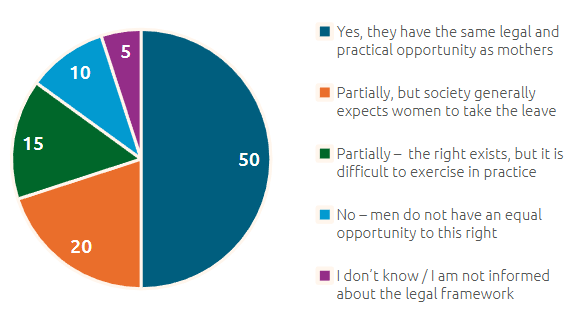Barriers to Work-Family Balance in Bosnia and Herzegovina: Gender Implications
Main Article Content
Abstract
Although laws in Bosnia and Herzegovina (B&H) formally guarantee the rights of pregnant women and mothers, their practical implementation is largely absent, preventing women from fully exercising their maternity rights. Women often face dismissals during pregnancy or after childbirth, and labour market discrimination remains unaddressed, particularly in the private sector, where fixed-term contracts hinder maternity leave access. Additionally, unequal wages contribute to disparities in maternity benefits, while paternal leave usage is minimal, reinforcing traditional gender roles in childcare. These structural factors impede the reconciliation of professional and family lives for women, shaping their experiences and perceptions of childbirth and parenting. This paper explores the main challenges women in B&H face in reconciling work and family life, with a focus on systemic, institutional, and cultural barriers. Drawing on a descriptive analysis based on quantitative empirical research conducted with women-working mothers from B&H in 2025, this paper identifies critical limitations on women’s participation in the labour market, without inferring causal relationships. Special attention is given to B&H’s family model, which heavily relies on women for care and unpaid work, making it difficult to achieve a more equitable distribution of responsibilities between partners. The paper explores potential legal and strategic mechanisms to align parental rights, enhance financial support, and encourage greater paternal involvement in childcare, highlighting implications for gender equality and institutional practice.
Article Details
Published by the Institute of Social Sciences - Center for Demographic Research
References
Beijing Declaration and Platform for Action. (1995). https://archive.unescwa.org/sites/www.unescwa.org/files/u1281/bdpfa_e.pdf
Bryson, V. (2007). Gender and the Politics of Time. Feminist Theory and Contemporary Debates. UK: Policy Press. https://dokumen.pub/gender-and-the-politics-of-time-feminist-theory-and-contemporary-debates-9781847422972.html DOI: https://doi.org/10.46692/9781847422972
Charter of Fundamental Rights of the European Union. (2012).
https://eur-lex.europa.eu/legal-content/EN/TXT/HTML/?uri=CELEX:12012P/TXT
Constitution of Bosnia and Herzegovina. (1995). https://www.ustavnisud.ba/uploads/documents/constitution-of-bih_1625734692.pdf
Council of Europe Convention on preventing and combating violence against women and domestic violence (Istanbul Convention). (2014). https://www.coe.int/en/web/gender-matters/council-of-europe-convention-on-preventing-and-combating-violence-against-women-and-domestic-violence
Council Directive 92/85/EEC of 19 October 1992 on the introduction of measures to encourage improvements in the safety and health at work of pregnant workers and workers who have recently given birth or are breastfeeding (tenth individual Directive within the meaning of Article 16 (1) of Directive 89/391/EEC). (1992). https://eur-lex.europa.eu/eli/dir/1992/85/oj/eng
Council Directive 97/81/EC of 15 December 1997 concerning the Framework Agreement on part-time work concluded by UNICE, CEEP and the ETUC. (1997). https://eur-lex.europa.eu/eli/dir/1997/81/oj/eng
Convention on the Elimination of All Forms of Discrimination against Women (CEDAW). (1981). https://www.ohchr.org/en/instruments-mechanisms/instruments/convention-elimination-all-forms-discrimination-against-women
Correll, S. J., Benard, S., & Paik, I. (2007). Getting a Job: Is There a Motherhood Penalty?. American Journal of Sociology, 112(5), 1297–1338. https://doi.org/10.1086/511799 DOI: https://doi.org/10.1086/511799
Crompton, R., & Lyonette, C. (2006). Work-Life ‘Balance’ in Europe. Acta Sociologica, 49(4), 379-393. https://doi.org/10.1177/0001699306071680 DOI: https://doi.org/10.1177/0001699306071680
Daly, M. (2011). Welfare. Cambridge: Polity Press.
Directive (EU) 2019/1158 of the European Parliament and of the Council of 20 June 2019 on work-life balance for parents and carers and repealing Council Directive 2010/18/EU. (2019, June 20). https://eur-lex.europa.eu/eli/dir/2019/1158/oj/eng
Directive 2006/54/EC of the European Parliament and of Council of 5 July 2006 on the implementation of the principle of equal opportunities and equal treatment of men and women in matters of employment and occupation (recast). (2006). https://eur-lex.europa.eu/eli/dir/2006/54/oj/eng
Duvander, A., Lappegard, T., Andersen, N. S., Garðarsdóttir, O., Neyer, G., & Viklund, I. (2019). Parental leave policies and continued childbearing in Iceland, Norway, and Sweden. Demographic Research, 40(51), 1501–1528. https://doi.org/10.4054/DemRes.2019.40.51 DOI: https://doi.org/10.4054/DemRes.2019.40.51
Esping-Andersen, G. (1999). Social Foundations of Postindustrial Economies. UK: Oxford University Press. https://doi.org/10.1093/0198742002.001.0001 DOI: https://doi.org/10.1093/0198742002.001.0001
European Pillar of Social Rights. (2017). https://employment-social-affairs.ec.europa.eu/policies-and-activities/european-pillar-social-rights-building-fairer-and-more-inclusive-european-union_en
European Social Charter. (1996). https://rm.coe.int/168007cf93
Fraser, N. (1997). Justice Interruptus: Critical Reflections on the „Postsocialist” Condition. New York: Routledge.
Fraser, N. (1994). After The Family Wage: Gender Equity and the Welfare State. Political Theory, 22(4), 591-618. https://doi.org/10.1177/0090591794022004003 (Original work published 1994) DOI: https://doi.org/10.1177/0090591794022004003
Gatrell, C. (2011). Managing the maternal body: A comprehensive review and transdisciplinary analysis. International Journal of Management Reviews, 13(1), 97–112. https://doi.org/10.1111/j.1468-2370.2010.00286.x DOI: https://doi.org/10.1111/j.1468-2370.2010.00286.x
Gornick, J. C., & Meyers, M. K. (2003). Families That Work: Policies for Reconciling Parenthood and Employment. New York: Russell Sage Foundation.
Hasanagić, S., & Papović, M. (2020). Uticaj rodne podjele porodičnih i kućanskih poslova na profesionalni život zaposlenih žena u Bosni i Hercegovini. Sarajevo: Agencija za ravnopravnost spolova Bosne i Hercegovine Ministarstva za ljudska prava i izbjeglice Bosne i Hercegovine. https://arsbih.gov.ba/wp-content/uploads/2020/09/Uticaj-rodne-podjele-porodi%C4%8Dnih-i-ku%C4%87anskih-poslova-na-profesionalni-%C5%BEivot-zaposlenih-%C5%BEena-u-BiH.pdf
Hobson, B., & Fahlén, S. (2009). Competing scenarios for European fathers: Applying Sen’s capabilities and agency framework to work–family balance. Annals of the American Academy of Political and Social Science, 624(1), 214–233. https://doi.org/10.1177/0002716209334435 DOI: https://doi.org/10.1177/0002716209334435
Kremer, M. (2007). How Welfare States Care: Culture, Gender and Parenting in Europe. (Changing Welfare States). Amsterdam: Amsterdam Univ. Press. https://d-nb.info/1191654788/34 DOI: https://doi.org/10.5117/9789053569757
Law on Gender Equality in Bosnia and Herzegovina. (2009). https://www.gcfbih.gov.ba/wp-content/uploads/2014/01/ZoRS_32_10_H.pdf
Law on Prohibition of Discrimination. (2016). https://udt.pravosudje.ba/vstvfo/E/10/article/146210
O’Brien, M., & Wall, K. (Eds.). (2017). Comparative Perspectives on Work-Life Balance and Gender Equality. Fathers on Leave Alone. NY: Springer. https://library.oapen.org/bitstream/id/23a8db9e-fd73-4c56-9ce7-d27e190cbe35/1001878.pdf DOI: https://doi.org/10.1007/978-3-319-42970-0
Republika Srpska Social Inclusion Strategy for 2021–2027. (2020). https://www.unicef.org/bih/media/6481/file/Republika%20Srpska%20Social%20Inclusion%20STRATEGY.pdf
Karamessini, M. & Rubery, J. (Eds.). (2018). Women and Austerity: The Economic Crisis and the Future for Gender Equality. NY: Routledge.
Saxonberg, S., & Sirovátka, T. (2006). Failing family policy in post-communist Central Europe. Journal of Comparative Policy Analysis: Research and Practice, 8(2), 185–202. https://doi.org/10.1080/13876980600682089 DOI: https://doi.org/10.1080/13876980600682089
Strategija razvoja preduzetništva žena Republike Srpske za period 2019–2023. godine. (2019). https://www.vladars.net/sr-SP-Cyrl/Vlada/Ministarstva/mpp/stratdok/Documents/Strategija%20razvoja%20preduzetnistva%20zena%20Republike%20Srpske%20za%20period%202019-2023.pdf
Strategija zapošljavanja Republike Srpske 2021-2027. (2021). https://vladars.rs/sr-SP-Cyrl/Vlada/Ministarstva/mpb/PAO/Pages/%D0%A1%D1%82%D1%80%D0%B0%D1%82%D0%B5%D0%B3%D0%B8%D1%98%D0%B0-%D0%B7%D0%B0%D0%BF%D0%BE%D1%88%D1%99%D0%B0%D0%B2%D0%B0%D1%9A%D0%B0-%D0%A0%D0%A1.aspx
Tomanović, S. (2017). Roditeljstvo između familizma i individualizacije: primer Srbije In S. Ignjatović & A. Bošković (Eds.), Individualizam (pp. 162–181). Beograd: Institut društvenih nauka.
Williams, J. C. (2012). Reshaping the Work-Family Debate: Why Men and Class Matter. Harvard: Harvard University Press. DOI: https://doi.org/10.2307/j.ctvjghv9t





